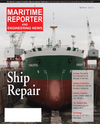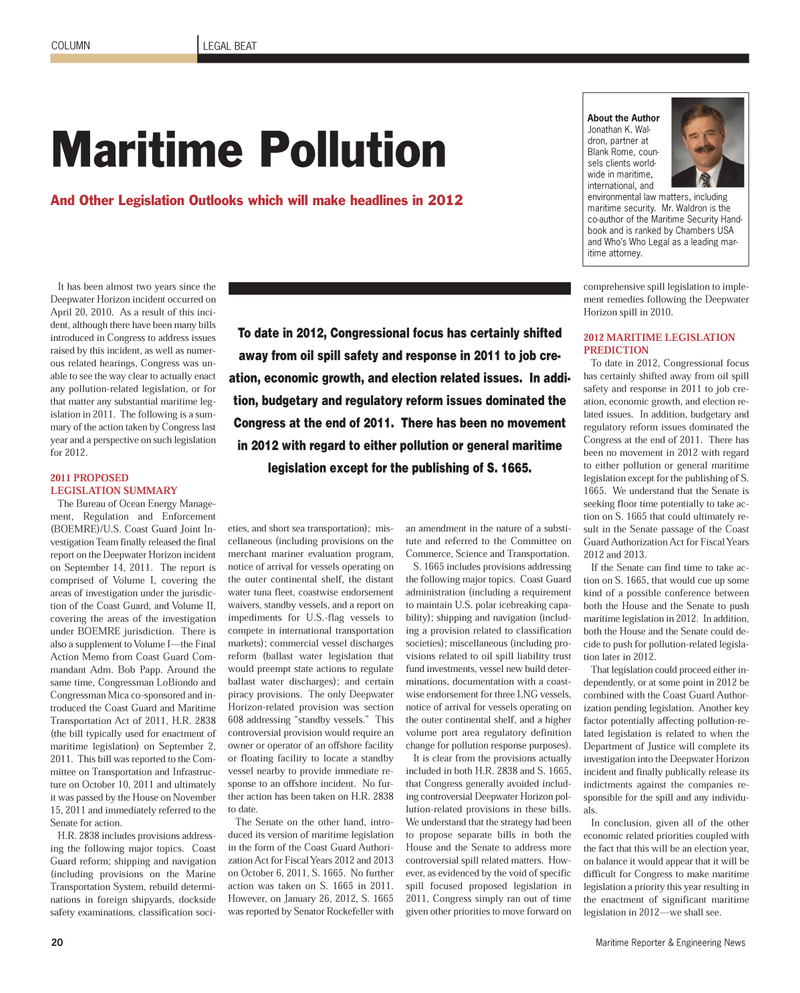
Page 20: of Maritime Reporter Magazine (March 2012)
The Ship Repair Edition
Read this page in Pdf, Flash or Html5 edition of March 2012 Maritime Reporter Magazine
20Maritime Reporter & Engineering News It has been almost two years since the Deepwater Horizon incident occurred on April 20, 2010. As a result of this inci- dent, although there have been many bills introduced in Congress to address issuesraised by this incident, as well as numer- ous related hearings, Congress was un- able to see the way clear to actually enact any pollution-related legislation, or for that matter any substantial maritime leg- islation in 2011. The following is a sum- mary of the action taken by Congress last year and a perspective on such legislation for 2012.2011 PROPOSED LEGISLATION SUMMARY The Bureau of Ocean Energy Manage- ment, Regulation and Enforcement(BOEMRE)/U.S. Coast Guard Joint In-vestigation Team finally released the final report on the Deepwater Horizon incident on September 14, 2011. The report is comprised of Volume I, covering the areas of investigation under the jurisdic- tion of the Coast Guard, and Volume II, covering the areas of the investigation under BOEMRE jurisdiction. There is also a supplement to Volume I?the Final Action Memo from Coast Guard Com-mandant Adm. Bob Papp. Around the same time, Congressman LoBiondo andCongressman Mica co-sponsored and in-troduced the Coast Guard and MaritimeTransportation Act of 2011, H.R. 2838 (the bill typically used for enactment ofmaritime legislation) on September 2, 2011. This bill was reported to the Com- mittee on Transportation and Infrastruc- ture on October 10, 2011 and ultimatelyit was passed by the House on November 15, 2011 and immediately referred to theSenate for action.H.R. 2838 includes provisions address- ing the following major topics. Coast Guard reform; shipping and navigation (including provisions on the Marine Transportation System, rebuild determi- nations in foreign shipyards, dockside safety examinations, classification soci- eties, and short sea transportation); mis-cellaneous (including provisions on the merchant mariner evaluation program, notice of arrival for vessels operating on the outer continental shelf, the distantwater tuna fleet, coastwise endorsement waivers, standby vessels, and a report on impediments for U.S.-flag vessels to compete in international transportationmarkets); commercial vessel discharges reform (ballast water legislation that would preempt state actions to regulate ballast water discharges); and certain piracy provisions. The only Deepwater Horizon-related provision was section 608 addressing ?standby vessels.? This controversial provision would require an owner or operator of an offshore facility or floating facility to locate a standby vessel nearby to provide immediate re- sponse to an offshore incident. No fur- ther action has been taken on H.R. 2838 to date.The Senate on the other hand, intro-duced its version of maritime legislation in the form of the Coast Guard Authori- zation Act for Fiscal Years 2012 and 2013 on October 6, 2011, S. 1665. No furtheraction was taken on S. 1665 in 2011. However, on January 26, 2012, S. 1665 was reported by Senator Rockefeller with an amendment in the nature of a substi-tute and referred to the Committee onCommerce, Science and Transportation. S. 1665 includes provisions addressing the following major topics. Coast Guard administration (including a requirementto maintain U.S. polar icebreaking capa-bility); shipping and navigation (includ- ing a provision related to classification societies); miscellaneous (including pro-visions related to oil spill liability trustfund investments, vessel new build deter- minations, documentation with a coast-wise endorsement for three LNG vessels, notice of arrival for vessels operating on the outer continental shelf, and a highervolume port area regulatory definition change for pollution response purposes). It is clear from the provisions actually included in both H.R. 2838 and S. 1665,that Congress generally avoided includ- ing controversial Deepwater Horizon pol- lution-related provisions in these bills. We understand that the strategy had been to propose separate bills in both theHouse and the Senate to address morecontroversial spill related matters. How- ever, as evidenced by the void of specific spill focused proposed legislation in 2011, Congress simply ran out of timegiven other priorities to move forward on comprehensive spill legislation to imple- ment remedies following the Deepwater Horizon spill in 2010. 2012 MARITIME LEGISLATION PREDICTIONTo date in 2012, Congressional focus has certainly shifted away from oil spill safety and response in 2011 to job cre-ation, economic growth, and election re- lated issues. In addition, budgetary and regulatory reform issues dominated the Congress at the end of 2011. There has been no movement in 2012 with regard to either pollution or general maritimelegislation except for the publishing of S. 1665. We understand that the Senate is seeking floor time potentially to take ac- tion on S. 1665 that could ultimately re-sult in the Senate passage of the CoastGuard Authorization Act for Fiscal Years 2012 and 2013.If the Senate can find time to take ac- tion on S. 1665, that would cue up some kind of a possible conference betweenboth the House and the Senate to pushmaritime legislation in 2012. In addition, both the House and the Senate could de-cide to push for pollution-related legisla- tion later in 2012. That legislation could proceed either in- dependently, or at some point in 2012 be combined with the Coast Guard Author- ization pending legislation. Another key factor potentially affecting pollution-re- lated legislation is related to when the Department of Justice will complete itsinvestigation into the Deepwater Horizon incident and finally publically release its indictments against the companies re- sponsible for the spill and any individu- als. In conclusion, given all of the other economic related priorities coupled withthe fact that this will be an election year, on balance it would appear that it will be difficult for Congress to make maritime legislation a priority this year resulting in the enactment of significant maritime legislation in 2012?we shall see. COLUMNLEGAL BEAT Maritime PollutionAbout the AuthorJonathan K. Wal- dron, partner at Blank Rome, coun-sels clients world-wide in maritime,international, andenvironmental law matters, including maritime security. Mr. Waldron is the co-author of the Maritime Security Hand-book and is ranked by Chambers USAand Who?s Who Legal as a leading mar- itime attorney. And Other Legislation Outlooks which will make headlines in 2012To date in 2012, Congressional focus has certainly shifted away from oil spill safety and response in 2011 to job cre- ation, economic growth, and election related issues. In addi- tion, budgetary and regulatory reform issues dominated the Congress at the end of 2011. There has been no movement in 2012 with regard to either pollution or general maritime legislation except for the publishing of S. 1665. MR March 12 # 3 (17-24):MR Template 3/1/2012 9:59 AM Page 20

 19
19

 21
21
